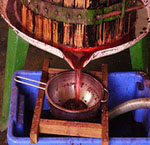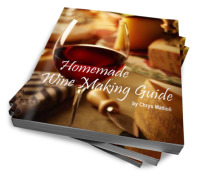More than anything, organic wine making is about growing a healthy grape without the use of chemicals. In your backyard, this might be easy since you’re making a limited quantity. Really, you only need to take care of enough vines to produce 10 – 20 pounds of grapes.
However, on an organic farm with acres and acres of vines, the methods are much different. At Bonterra Vineyards, the U.S.’s largest producer of organic wines, everything from birds to sheep, from leaf-pickers to controlled insects are used to thwart disease, mildew and damage.
At Bonterra wild pigs and sheep are allowed to roam through the vineyards. They eat unwanted weeds and leave fertilizer throughout the acreage.
They plant Lavendar, Queen Anne’s Lace, olives and other plants to attract a variety of insects and animals to the vineyard. Queen Anne’s Lace was found to attract predator bugs that actually fed on the harmful insects.
Planting other crops between the rows also encourages more natural, mineral rich soil which the grapes thrive.
Organic Wine Making is more than just growing grapes, it’s truly a process of managed nature in a way that produces the best grapes.
Organic Wine Making Process
1) Flavor. Crushers and Pressers are the primary wine making equipment that are used to extract the juice from the grapes.

2) Fermentation. To prepare the grape juice extract for fermentation, yeast is added to produce the yeast colony. At this stage, oxygen is required for the yeast to do its thing. During the second phase, known as the production of alcohol, the barrels must be sealed with airlocks or heavy lidded stoppers.
3) Maturation. Once the oxygen trapped in the barrel, in the juice and in the yeast has been exhausted the yeast falls to the bottom. This is the time that the skins are separated from the wine. The longer the skins remain with the wine (8-10 days), the more resveratrol there will be in the wine.
To separate the yeast sediment, the skins and any other undesirables, you need to transfer the wine from the fermenter using a funnel or siphon. You may either transfer the wine to another barrel fermenter or bottle it.
Transferring the wine to another cask or wine barrel will give the wine additional flavor. Bottling it seals in the flavors forever. Whatever you do, make sure the vessel is clean and air tight.
Choose racks that facilitate optimum quality of aging. Remember that new wine does not taste as good as old wine. Do not hurry the maturation process. The older the wine is, the better the taste or flavor is.
Storing and Serving the wine is another matter all together. The best red wine storage temperature is somewhere around 50 to 60 degrees Fahrenheit.You also want to make sure that you store it in a location where it doesn’t get direct sunlight.
Organic Wine Making Facts
What’s involved with organic wine making?
Some quick facts to wet your whistle:
- It takes 18 lbs of ripe red grapes to make about five 750ml bottles of wine plus a minimum of 6 months to age it.
- Bottles of organic red wines cost approximately $13.00.
- The average grape costs approximately $2.00 per lb.
- You will need 18 lbs plus additional ingredients and supplies which will mean the first batch of wine will cost you more than the average store bought bottle.
However every batch that you make from then on will cost the same or less than the average store bought bottle. If that has not scared you off and you are up for the challenge then I would suggest finding a good local wine store and talking to the sommelier or learning from organic wine suppliers in your area. They should be able to point you in the right direction. If you want to read about it try one of these recommended organic wine making books or subscribe to a winemaker magazine.
Sometimes it can be a fun project to grow the grapes, make the wine and then drink the fruit of your labor on your front porch. Making your own organic wine gift baskets would be truly be a “from-the-heart” gift.
